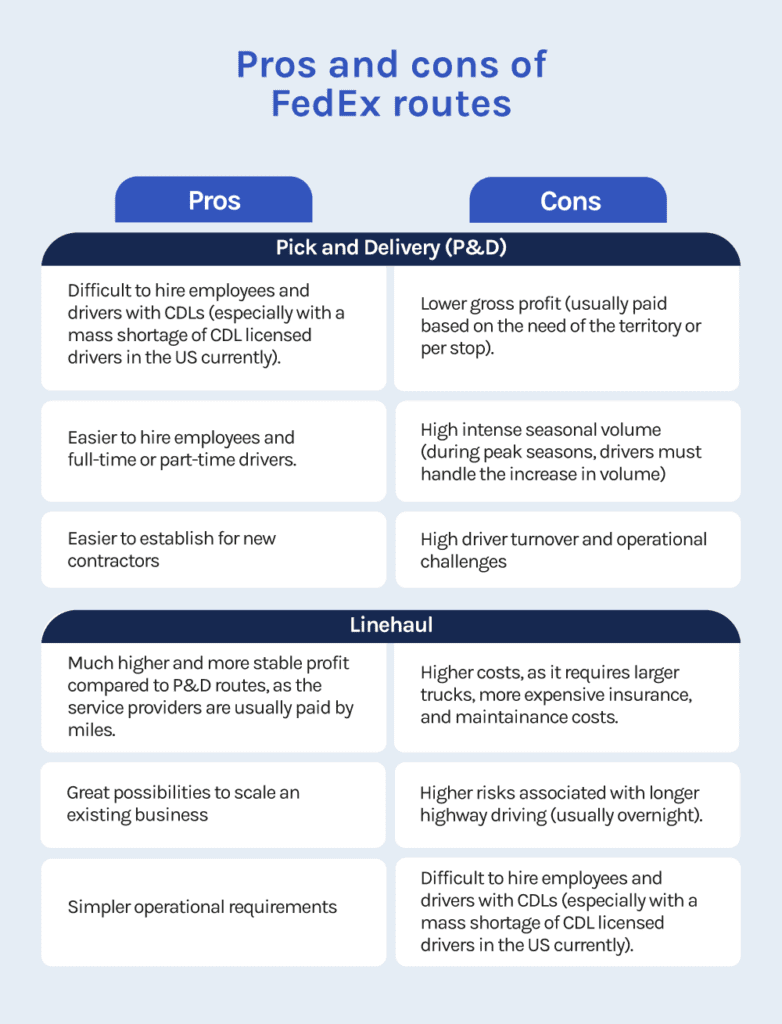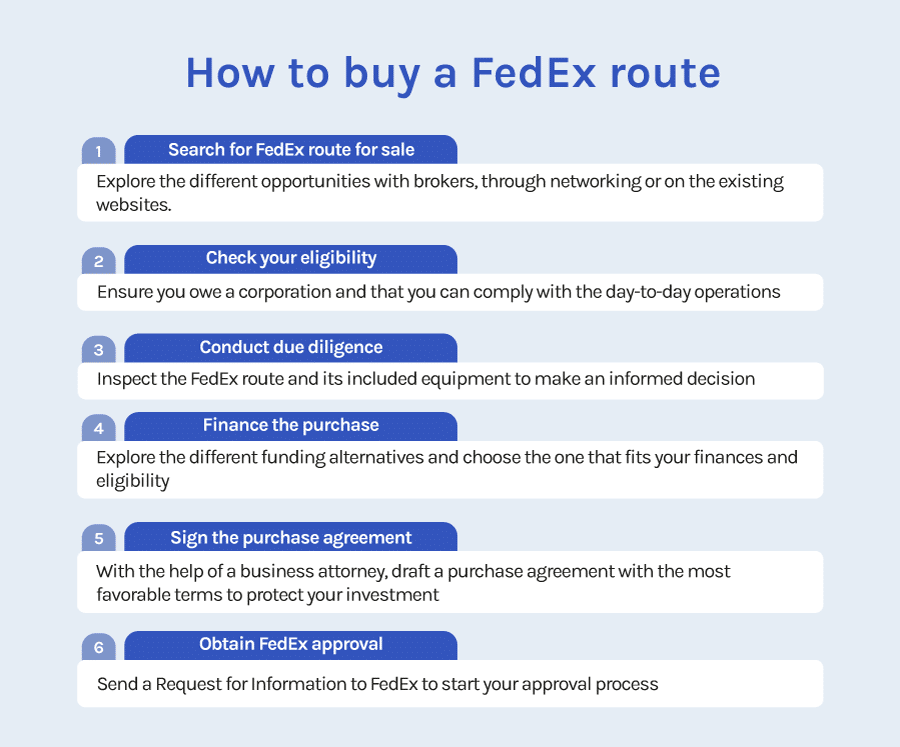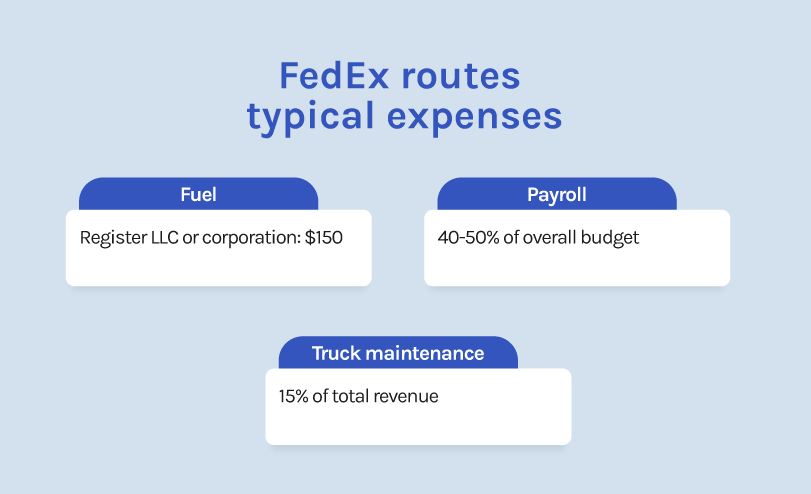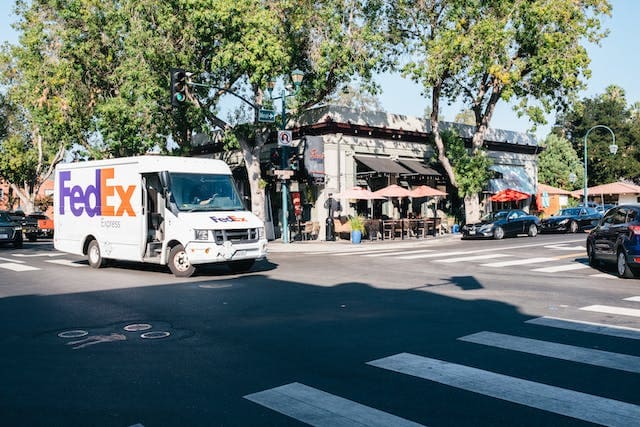FedEx, short for Federal Express, is a globally recognized courier delivery service that specializes in small package information, transportation, pickup, and delivery domestically or internationally between the US and Canada. Did you know that you can buy a FedEx route and benefit from each delivery that you make in your assigned territory?
FedEx is one of the world’s largest and most trusted courier delivery services that offers entrepreneurs the chance to own and operate routes as independent contractors. In this guide, we will take you through the step-by-step process of buying a FedEx Ground route, covering everything, from understanding the different route options to navigating legal aspects.
How do FedEx route businesses work?
Instead of owning trucks and employing drivers to fulfill the delivery services directly, FedEx Ground contracts with independent service providers that hire their own employees to provide delivery or transportation service to customers within an agreed-upon service area.
This means that when you are buying a FedEx route, you are essentially paying for the trucks and entering an agreement that will allow you to operate in a legally protected territory under FedEx’s brand.
Unlike a franchise that requires the grant of territory rights in exchange for a fee, FedEx Ground enters into agreements with businesses for their services without charging the businesses. Service providers provide such services with their own employees and receive payments from FedEx Ground. There is no initial fee required to become an eligible business as FedEx is not selling a business opportunity. Service providers get to run their businesses without much interference from FedEx Ground.
How can I buy a FedEx route?
If you want to buy a FedEx route, you have several options. If you do not owe a business, you should start a corporation to be eligible. If you already have one, you can start your application process.
The easiest option is to buy an existing business that has a contractor agreement with the delivery company. This way, you’ll save time and effort in building relationships from scratch.
If the targeting route has a profitability track record, it is almost guaranteed cash flow for you once you start your operation.
However, it is usually more expensive to buy an established route with its existing assets (vehicles, equipment, infrastructure, and employment contracts).
More importantly, a business contract with FedEx Ground is subject to renewal annually, if the targeting business loses FedEx Ground as its only customer, you may end up running a business with only trucks and equipment that need to maintain but no customers.
To protect your investment, it is important to conduct due diligence to examine the profitability of the transaction, carefully draft and negotiate a purchase agreement, and make sure you have a financing plan that does not require you to pay 100% of the purchase price out of your pocket.
A sophisticated M&A lawyer will advise you to consider asking the seller to finance part of the transaction while you only put a certain percentage down initially. To further minimize your risk, you may also be contingent after closing payments to the seller upon the continuation of business with FedEx Ground.
Your role as owner of a FedEx route
As an independent business, once you buy a route you will employ your own personnel to fulfill the services and bear all responsibilities of running a business, including:
- Employer-related expenses, including wages, salaries, benefits, employment taxes, unemployment insurance, and other federal or state taxes.
- Payroll deductions, maintaining payroll and employment records and complying with all applicable laws and regulations.
- Recruiting and training personnel.
- Obtaining and maintaining trucks and equipment, including insurance.
Contractual obligations as a FedEx Independent Contractor
Entering an independent contractor agreement with FedEx usually involves the following:
- The contractor agreement with FedEx has an average duration of one to three years. The contract will renew automatically unless the contractor wants to withdraw from the deal or if the delivery company determines the terms of the agreement are not being met.
- Run the day-to-day operations of the route.
- Ensure all operators and employees use FedEx uniforms, abide by a specific code of conduct, and comply with driving requirements.
- Since you are an independent contractor, not an employee, you will not receive any benefits. For this reason, you will be responsible for your taxes, insurance, and retirement plan.
Types of FedEx routes
There are two types of FedEx Ground routes (the most common routes for outsourcing): pickup and delivery (P&D) routes and linehaul runs.
- P&D Routes: Pick up and Delivery routes involve the daily pick-up and delivery of packages to businesses and homes within a specific territory. They typically operate during the day.
- Linehaul routes: Unlike P&D routes, which focus on local package transportation, linehaul routes involve interstate transportation to deliver packages between different FedEx facilities. Therefore, they typically utilize trailers and require drivers to hold valid Commercial Driver’s Licenses (CDLs) and meet specific driving experience demands. Linehaul route service providers often operate at night or during lower traffic time.
Comparatively, a P&D route is an excellent option if you are just getting started. On the other hand, a linehaul run is more lucrative, but it also entails more risks and regulations. However, both are incredibly profitable investments for the right service providers.

Pros and cons of buying a FedEx Route
Although buying a FedEx route sounds like an investment with a high probability of success, there are some considerations you must keep in regard and gauge whether they suit your financial situation and professional goals.
FedEx route Advantages
- Built-in brand recognition: By operating under the FedEx brand, you will benefit from using a reliable business model with an established customer base and revenue stream.
- Reliable income: Although sales will vary according to the season, FedEx routes typically offer a stable income because of its consistent demand.
- Quick payment: While some companies may be forced to wait for more than 30 days to get paid, FedEx pays almost immediately so you don’t have to worry about covering business expenses.
- Ongoing support: As part of the FedEx network, you will receive training and have access to resources and systems that will help you navigate the logistics industry and operate your business efficiently.
- Flexibility: Owning a FedEx route allows you to be your own boss and have control over your schedule. You can manage your operations from afar or according to your preferences and adapt to the needs of your business.
- Save on marketing expenses: Under this business model, you don’t have to spend time on money on sales on marketing or customer acquisition.
FedEx route Disadvantages
- Initial investment: Acquiring a FedEx route typically requires a significant upfront investment. This includes the purchase price of the route, as well as any additional costs for vehicles, equipment, and other operational expenses.
- Difficulty to finance: Trying to find funding options for buying a FedEx route may be challenging since lenders who offer financing for this purpose are scarce. Also, route sellers typically fail to prove the profitability of the business because they do not have accurate financial statements.
- Regulation compliance: You need to ensure you have the required licenses and permits for your logistics business and that you comply with state and federal trucking laws.
- Operational Challenges: Running a FedEx route involves managing complex logistics, coordinating deliveries, and handling customer service inquiries. It requires effective organization, time management, and problem-solving skills. The operational challenges can be demanding and require dedicated effort.
- Recruiting employees: By owning a FedEx route, you’re going to have to manage employees, which includes recruiting, training, and dealing with drivers and other employees. The difficulty of finding qualified personnel will increase if you have a linehaul route.
- Work on holidays: Since some festivities are during the seasons with the highest demand, you will have to work on these days.
Buying a FedEx Route: Expected costs and profit
Costs
As mentioned before, purchasing a FedEx route requires a hefty initial investment. Here is a breakdown of the required expenses for purchasing a FedEx route.
- Buying the route: The cost of the route varies based on its location, number of employees, and other factors. You will likely be required a down payment between 10% to 25% of the total purchase price, which corresponds to $60,000 to $100,000.
- Recruiting employees and paying wages: As a FedEx contractor, you are likely to hire an average of seven employees, for which you will have to pay wages, health insurance, and retirement plans.
- Vehicles and equipment: Typically, once you buy a FedEx route, vehicles are going to be included in the purchase price. But apart from trucks and vans, you will have to purchase uniforms for your workforce, decals, scanners, software, fuel, and maintenance costs.
To start with, you will likely be required a down payment between 10% to 25% of the total purchase price, which corresponds to $60,000 to $100,000.
Profit
According to the agreement, FedEx contractors may be paid in three different ways:
- Annual fixed fee: Contractors are paid a pre-established flat fee each year that is contingent on the route’s size and location
- Payment per service: Contractors are paid $1 for each delivery and $2 for pickup.
- Incentives: By complying with customer service and safety standards, contractors may receive additional payments.
The profit margins will vary according to the type of route, location, number of employees, and demand. However, experts claim that the estimated average business generates about 10%-25% of revenue, which is an approximate annual profit of around $30,000 or $40,000.
How to purchase a FedEx route?

1. Search for FedEx routes for sale
The first step is to look for FedEx routes across different channels. There are several ways you can research.
Networking: Attend industry events, and join forums or social media groups related to FedEx contractors. Engaging with other contractors can provide valuable insights and potential leads on routes for sale. You can also start by contacting people who are part of the shipping industry and ask them whether they know about any route-buying opportunities.
Brokers: Consider contacting business brokers who specialize in buying and selling routes. They may have listings for FedEx routes or can assist you in finding available opportunities.
Online: Websites are a great source if you want to find contracting opportunities. Some of the most relevant sites are the following:
- Build A Ground Biz: This is FedEx’s official site where they post business opportunities. However, they post a limited amount of offers, typically a dozen. If you own a business, you can find a contracting opportunity here or request to be contacted to get more information.
- Biz BuySell: This site is one of the most popular ones for buying and selling businesses in the US. By using the advanced features, you will be able to get results specifically for FedEx routes in your area.
- Routes to Success: This site was exclusively built to promote route listings. You can find buying opportunities in New York, Texas, Georgia, and other states.
2. check your eligibility
Before you dig deeper into the kind of route you would like, ensure you are a good candidate for obtaining a contractor agreement with FedEx. To own a FedEx route business, you should sign a FedEx Independent Service Provider (ISP) agreement. Some of the requirements for you to be eligible are the following:
- Your business must be structured as a corporation: FedEx Ground only contracts with independent businesses that are established as for-profit corporations under the state/provincial law in the US and Canada, and not with limited liability companies (LLCs), limited liability partnerships (LLPs), sole proprietorships, or limited partnerships (LTDs).
- Recruiting and training: The contractor should have responsibility for employee-related expenses, payroll deductions, training personnel, and ensuring employees are legally allowed to work in the US.
- Responsibilities: Maintain safety and compliance program, ensure the corporation remains in good standing, comply with quality standards and commit to FedEx business, and procure vehicle maintenance. You will also need to assign an authorized officer to address the contractual issues of the business and a business contact to be the touch point for day-to-day operational issues.
- Route requirements: Have a minimum of 5 routes or achieve 500 stops per day. Cannot hold more than 15% of routes in a given termination. Prove both business and home deliveries within the territory.
- Owner-operator requirements: Most route owners are also the operators of their units. As such, they have to comply with the following rules:
- Not exceeding 3 moving violations in the last three years, neither one in the last 12 months.
- Passing the Department of Transportation physical and drug test.
- Having a valid and up-to-date Commercial Driver’s License.
3. Conduct due diligence
Once you have found the ideal FedEx route and ensured you are eligible, it’s time to evaluate the options and choose the one that has the most promising future.
Before acquiring a FedEx route, it is of the utmost importance that you assess its potential profitability and underlying risks. This is why you should conduct due diligence, which is the process by which you will analyze the financials of the business and the conditions of the equipment.
Remember that to identify liabilities and ensure you are entering a good deal, you should look for professional assistance in this stage, such as acquisition attorneys and accountants.
Some of the things you must look into before buying the business are the following:
- Costs: Analyze the viability of the price according to its annual revenue. FedEx routes typically operate at profit margins of 15-25%, or 20% to 30% for linehaul runs. Higher profits may indicate financial manipulation in the figures.
- Financials: With the assistance of an accountant, review profit and loss statements, balance sheets, income statements, and tax returns for the three past years. FedEx routes expenses should fall in a certain range.
- Employees: Assess the number of employees, employment agreements, payroll reports, retention rates, and personnel policies.
- Vehicles and equipment: Closely examine the age and condition of the vehicles and equipment, the number of units, lease agreements, maintenance reports, and mileage.
- Contracts and corporate documents: Research the incorporation documents of the company, shareholders and percentage of ownership, past or outstanding litigation, and a copy of the contract with FedEx.

Some questions you can ask the seller:
- Why do you want to sell this route?
- How many FedEx routes do you have now?
- What is the estimated value of the vehicles?
- How many deliveries are you doing?
- How many drivers do you have?
- For a typical truck, how many miles will it accumulate in a given year?
- How did you get into this business?
- How much do I need to sustain the business?
4. Finance the purchase
Once you have analyzed your decision, it is time for you to look for alternatives to fund your acquisition.
It’s key to remember that whenever you are looking to finance an entrepreneurship project, having creditworthiness, a business plan, and industry experience will make the process smoother and increase your possibilities of getting funding.
There are some options you can aspire to, according to your financial situation and eligibility requirements:
- Seller financing: As a buyer, you can ask the seller whether they offer seller financing, this means if they are willing to accept a down payment and then the remaining amount in monthly installments with an interest rate.
- Term loans: You can also ask a financial institution for a loan. Keep in mind that if you use this resource, likely, you are going to be subject to scrutiny. Banks typically require a personal credit score higher than 680, put up collateral, require more than a 20% down payment, and ask for higher monthly payments. Nonetheless, these loans have lower interest rates compared to the SBA and have a quicker
- SBA loans: Endorsed by the government, the SBA offers funding options that can be used for working capital or to purchase equipment. SBA loans often offer longer terms with lower down payments and accessible monthly installments. However, interest rates vary according to the lender and they usually have a lengthy application process.
5. Sign the purchase agreement
The due diligence process is over, you have understood the implications of the transaction, analyzed the financials and contracts, and identified the risks associated with the purchase. Now you are ready to move forward and close the deal.
This is the time to draft a purchase agreement that will address all the liabilities that appeared after the examination. This purchase agreement, drafted by your business attorney, will define an adequate purchase price according to the business valuation and add clauses that mitigate the risks of the transaction.
The seller will review the contract and you may be required to negotiate the terms of the deal to get the most favorable deal for both.
6. Obtain FedEx Approval
After signing the purchase agreement, you’ll need to create and send a request for information (RFI) to FedEx to begin the approval process. The RFI contains the buyer’s business plan, goals, marketing strategies, and financial objectives.
Through an RFI, you will demonstrate whether your experience is enough to meet FedEx standards and contractual obligations. With this application, you will share with FedEx key elements of your business capabilities, such as:
- Financial viability: You will disclose revenue projections, expansion plans, and other records that will showcase the financial sustainability of your business.
- Managing and operations: Demonstrate you understand you are able to manage operating difficulties, such as package security, equipment failure, increased package volumes, and meeting the clients’ demands.
- Resources: Current equipment and employment and ability to expand.
- Customer service approach: Show how well you know FedEx products, systems, and operations. Also, that you have the needed knowledge to solve issues from your customers.
- Safety: Having past job experience where you handled safety-related issues or showing your commitment to complying with safety guidelines will help you meet FedEx expectations.
- Legal compliance: Ensure you comply with the legal requirements of the business, including labor laws, insurance, and taxes.
There are many other ways to protect your investment and minimize your legal risks when pursuing a service contract with FedEx Ground, if you are interested in providing transportation services to FedEx Ground in the US and Canada or diving into the trucking business in general, Motiva Business Law is here to help. Feel free to contact us at (630) 517-5529 or email frontdesk@motivalaw.com


